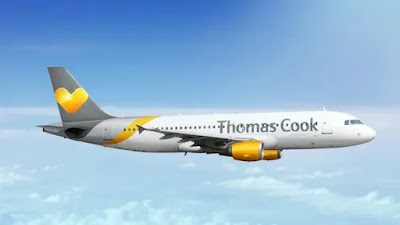The Collapse of Thomas Cook and the Start of the Blame Game
Earlier this morning, the saga surrounding the British
travel firm Thomas Cook came to an end with the news that ‘last-minute
negotiations aimed at saving the 178 year old holiday firm had failed’.
With the tabloids and social media being flooded with stories of customers
stranded abroad, and also with statements from the thousands of employees who
have lost their jobs and, apparently, learned of this via the press, it is
clear that the saga is far from over. However, a number of issues have arisen
from the responses to the collapse this morning, and in this post we will
analyse those responses.
Thomas Cook had been struggling for quite some time. In the
summer it had reported a £1.5
billion loss. Over the year, it had issued 3 separate profit warnings. As a
result, it had sought to bring in new investment and reconfigure its debts. The
new deal involved the Chinese Group Fosun – a conglomerate that also
owns British Football Club Wolverhampton Wanderers – and would see the
conglomerate become the major shareholder. The plan would involve diluting the
position of a number of existing shareholders, but the company had responded by
claiming that it was the best way to secure the future of the company: ‘it means the oldest brand
in travel will continue to deliver good-value travel’. Yet, the deal was
not secured by the time a number of other factors had come to the forefront. It
was reported earlier this week that the company would fall into administration
if the rescue deal was not secured, and that the aspect that was preventing the
deal from being secured was that its creditor banks had requested that the
company find another £200 million in contingency funds. The result had been for
Thomas Cook to approach the government for a bail-out. The BBC had reported
that the Government took the view that it was not a decision between a £200
million bail out and a £600 million cost for a mass repatriation, because
Thomas Cook Customers are protected by Atol – a fund paid for by levies paid by
industry members. This stance was confirmed by Boris Johnson, who had suggested
there was a ‘moral
hazard’ to rescuing Thomas Cook, particularly as the Government had refused
to save companies like Carillion. That may be fair enough, but it is worth
noting that the bank that insisted on the increased contingency – RBS – is still
majoritively owned by the Government (though some may remind me that the
nationalisation of the bank was confirmed under a different party).
In the immediate aftermath, the Conservative Government is
seeking to emerge with some credibility, and have chosen the role of Directors
as the vehicle with which to do so. Johnson was cited as saying that ‘one
is driven to reflect on whether the directors of these companies are properly
incentivised to sort such matters out’. On the one hand, this approach
could be incredibly progressive. There is a movement, of sorts, within business
circles currently to discuss and action elements of ‘short-termism’,
and the fight against it. Industry heavyweights such as JP Morgan and Berkshire
Hathaway have recently
launched campaigns to guard against the damaging effects of the ideology.
Yet, on the other hand, is this just a way for the Government to spin a massive
corporate failure to their advantage? At the moment, there are 22,000 jobs on
the line and the country is facing its largest-ever peacetime repatriation –
there are more than 150,000 customers stranded abroad this morning. If we also
factor in the timing of this collapse – just more than a month before the scheduled
exit from the EU – then this saga could become extremely damaging for the
pro-business Conservative Government. What is the likelihood of the Government
taking action against Directors and attempting to influence business policies
from an ideological level? Probably not high. We have seen Sir Philip Green
take part in the destruction of British High Street stalwarts like BHS, with no
accompanying punishment. We are seeing the High Street close around us, with no
change to how business is conducted. Finally, we are seeing massive amounts of
tax-payers money being appropriated to the Brexit-cause – billions of pounds.
Yet, the counter-argument is that Thomas Cook was a company existing within a
dying space. Its ownership of its own fleet makes sense during peak times, but
becomes a year-long fixed cost that other tour operators rarely have. The
amount of customers using the internet to book their holidays themselves, and
not through tour operators, have risen significantly. There is also the
suggestion in this morning’s press that British Customers no longer flock
towards the ‘fly
and flop’ holidays, although the 150,000 people currently abroad may
suggest otherwise, if only slightly. The end result is the loss of yet another
historic company from the British landscape. If one takes a holistic view of
the state of British business, it is quite extraordinary. Whether that is
because the country (and likely the world at large) is still dealing with the
effects of the Crisis, or whether it is related to Brexit, is unknown. It may
just relate to changing customer attitudes and practices, or it could relate to
poor management within the company itself. Nevertheless, for those employees
and customers left stranded this morning, the reasoning will be of little
comfort.
Keywords – Thomas Cook, Business, UK, Airlines, @finregmatters





Comments
Post a Comment